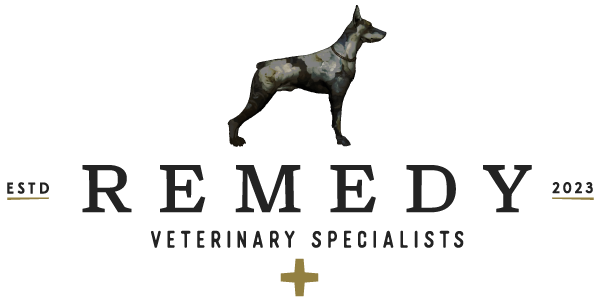FIBROCATILAGENOUS EMBOLI
(AKA FCE or Type-3 IVDD)
Introduction to Fibrocartilaginous Emboli (FCE) and Type-3 Disc Rupture
Fibrocartilaginous Emboli (FCE) is a spinal cord condition occurring when a small piece of disc cartilage obstructs a blood vessel within the spinal cord. While there are several theories about how this piece of cartilage ends up in the spinal cord, the exact cause remains unclear. FCE is often compared to a Type-3 disc rupture, also known as an acute non-compressive disc extrusion.
In a Type-3 disc rupture, the intervertebral disc, which functions like a cushion between the spine's bones, experiences a traumatic event. This disc resembles a jelly doughnut, with a tougher outer portion (annulus) and a jelly-like interior (nucleus pulposus). Trauma, such as a dog mislanding after a jump, can cause a small amount of this "jelly" to be propelled out of the disc and impact the spinal cord. This leads to bleeding, damage, and bruising within the spinal cord.
Typically, this is a disease of young large breed dogs, although small dogs and cats may also be affected. It often occurs when they are exercising or playing. Pet’s will often cry out when it first occurs, but the disease does not appear to be painful shortly thereafter. Usually signs will be worse on one side of the body. Signs can get worse for as long as a day, but after that they should stabilize and begin to improve.
Diagnosis
Diagnosis of an FCE and Type 3 Disc Disease requires an MRI. In some instances the neurology team may also recommend a spinal tap or infectious disease testing to make sure that your dog’s problem is not caused by a different disease that may look similar on MRI.
Treatment
Much like a bruise on your arm, there is little to do for this injury but wait for it to heal. The good news is that most dogs will be able to regain function over time. This healing takes weeks to months. There are some pets with particularly severe injuries who do not have as good of prognosis, and your doctor will discuss that with you if this is the case with your pet.
Because there may be a small tear in the outer layer of the disc, we recommend that you rest your pet while they are healing so more disc material does not squirt out. This means your pet needs to be confined to a small area and restricted from jumping on furniture. This may mean a crate or play pen is necessary. This crate should be just large enough for your dog to stand up comfortably and turn around. They should be in this crate at ALL TIMES except for three short 10-minute leash walks and during physical therapy. These walks MUST be performed on a leash. If your pet has neck pain, they should wear a harness (rather than a neck collar) and all walks should be done with the leash attached to the harness.
If your pet is small enough, you may hold them while you are doing activities like reading or watching TV. You must have direct physical control over them at all times. If you need to get up- even for just a second- you MUST put them back in the crate first. Unfortunately, many pets will get much worse after doing something like jumping off a couch or bed. It only takes a split second for them to really hurt themselves. Be careful!
Most pets with this injury are not painful, so no pain medications are required. Some pets need a sedative to comfortably cage rest- please let us know if you need a sedative.
Some pets, especially those with a significant injury, benefit from a structured physical therapy plan. If you would like to meet with our rehabilitation department, please make an appointment.
If your pet is not improving over the course of several weeks, or you feel at any point they are starting to get worse, contact your veterinarian for advice. Also, contact your veterinarian urgently if your pet has not urinated in over 24 hours.
When is this an emergency?
Please seek emergency veterinary advice if any of the following is happening:
Loses the ability to walk or attempt standing.
No urination for over 24 hours.
Pain that is not controlled by medications.
Contact Us:
Mon \ Fri: 8:30am - 5:30pm
Sat: by appointment only
Phone: (415)967-3303
Email: frontdesk@remedyvets.com



